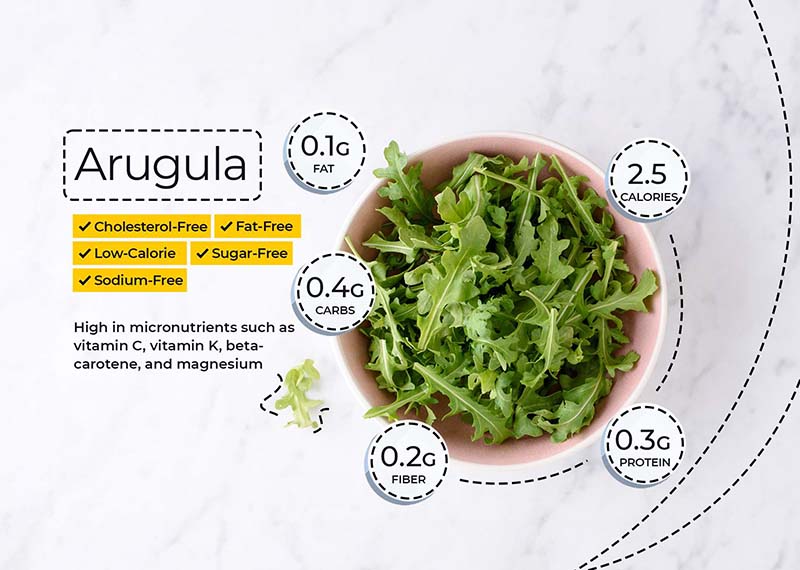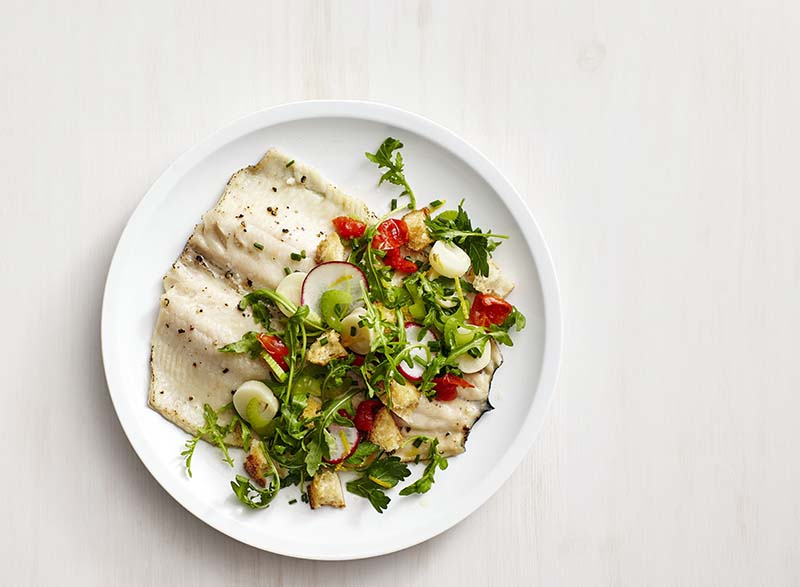Imagine a world where weight loss was as simple as enjoying a delicious salad. Well, that world might just be closer than you think! In this blog, we’ll introduce you to arugula, a culinary delight that also happens to be a powerful ally in your weight loss journey.
Join us as we delve into the science and practical tips behind the question, “Is arugula good for weight loss?” Get ready for a tasty path towards a healthier lifestyle.
Read more
- Does Broccoli Help You Lose Weight? The Secret Revealed.
- Is Bok Choy Good for Weight Loss? Insights into Its Health Advantages.
- Are Bell Peppers Good for Weight Loss? Discover the Secret!.

Is Arugula Good For Weight Loss?
Arugula can be a helpful addition to a weight loss diet. This leafy green is very low in calories, with only 5 calories per one-cup serving. Eating arugula allows you to have filling, tasty meals without consuming too many calories.
Besides adding a unique flavor to your dishes, arugula is also rich in important nutrients. It’s a smart choice for adding volume and nutrition to your meals without the extra calories.

Overview of Arugula
Arugula, a leafy green from the Mediterranean, is a popular ingredient in salads across Southern Europe and has become loved worldwide for its unique peppery and slightly
nutty taste. It’s also packed with good-for-you nutrients like calcium, iron, and vitamins A, C, and K. Young arugula leaves are usually eaten raw and are especially tasty and nutritious.
When arugula starts growing, it first forms a group of leaves close to the ground, which can look either smooth or a bit jagged. If the weather is cool, these young leaves are milder in taste and can be picked throughout spring or early fall. As it gets warmer, the leaves start to taste more bitter. Arugula grows quite tall (up to about 70 cm or 2.5 feet) as it gets ready to flower in the middle of summer. At this stage, the leaves are usually too bitter to eat. The plant then makes white flowers with purple lines and clusters of pods, known as siliques, which contain seeds. A spicy oil can be made from these seeds, and it’s used in traditional home remedies.
Arugula’s Nutritional Composition
A half-cup serving of arugula, which weighs around 10 grams, is a nutritional powerhouse with minimal calories. It contains only 2.5 calories, alongside 0.3 grams of protein, 0.4 grams of carbohydrates, and a mere 0.1 grams of fat. This makes arugula an excellent addition to a healthy diet, particularly for those monitoring their calorie intake. It’s rich in vitamin C and vitamin K, as per the USDA’s nutritional information.
Breaking down the nutrition:
- Calories: 2.5
- Fat: 0.1g
- Sodium: 2.7mg
- Carbohydrates: 0.4g
- Fiber: 0.2g
- Sugars: 0.2g
- Protein: 0.3g
- Vitamin C: 1.5mg
- Vitamin K: 10.9mcg
Arugula is incredibly low in carbohydrates, with less than 1 gram per serving. Although not as high in fiber compared to other cruciferous vegetables, a larger serving, like 2 cups of raw arugula, can provide about 0.8 grams of fiber.
Being a leafy vegetable, arugula has virtually no fat, making it an ideal choice for low-fat diets.
In terms of protein, arugula offers a small amount. For those using it as a main salad ingredient, it’s a good idea to add a protein source, like chicken or black beans, to create a balanced meal.
Arugula’s real strength lies in its micronutrients. It’s abundant in beta-carotene, vitamin C, folate, vitamin K, and magnesium. A two-cup serving of raw arugula can fulfill 20% of the daily requirement for vitamin A, 50% for vitamin K, and about 8% each for vitamin C, folate, and calcium.
When it comes to calories, arugula is very low, with approximately 5 calories per cup. This is comparable to other leafy greens like spinach and kale, making it a superb choice for calorie-conscious eaters.

Potential Health Benefits of Arugula
Arugula, a nutrient-rich leafy green, is an excellent addition to a health-conscious diet. Here’s a breakdown of its potential health benefits:
Supports Weight Loss
Arugula is a fantastic choice for weight loss diets due to its low calorie count, with about 25 calories per 100g serving. It’s low in carbohydrates and high in fiber, helping to curb hunger without adding excessive calories. Arugula’s nutrient density ensures you’re getting essential vitamins and minerals without the risk of weight gain.
Enhances Vision
Rich in beta carotene, arugula is great for eye health. Beta carotene combats free radicals that could damage the retina and helps in recycling eye-protective nutrients like lutein and zeaxanthin. With about 1420 µg of beta carotene per 100 grams, arugula can aid in preventing vision problems like macular degeneration and poor night vision. Its Omega 3 content also helps reduce the risk of cataracts.
Beneficial During Pregnancy
Arugula is a powerhouse of nutrients vital for expecting mothers. It provides iron, folate, calcium, protein, vitamins A, B, C, magnesium, and zinc. Particularly, it offers about 24% of the recommended daily intake of folate, essential for fetal development and reducing certain birth defects. Research indicates that folate plays an essential role in reducing the incidence of certain neural defects in newborns, emphasizing its importance in fetal development.

Facilitates Detoxification
Loaded with vitamin C, chlorophyll, and antioxidants, arugula helps in detoxifying the body. These nutrients aid in neutralizing harmful substances like free radicals, heavy metals, and chemicals from the diet. Regular consumption can lead to a healthier liver and stronger immune system.
Reduces Inflammation
A recent study highlights the inclusion of arugula as part of a daily diet rich in leafy greens, specifically for its anti-inflammatory properties beneficial to individuals with rheumatoid arthritis. Arugula contains compounds like isothiocyanates and 3-carbinol, which have been shown to suppress inflammation. Especially beneficial for those with metabolic syndrome or rheumatoid arthritis, these compounds help manage oxidative stress and reduce inflammation.
Aids Digestion
High in fiber, arugula can improve digestion and prevent indigestion. Its magnesium and Vitamin C content promote a healthy digestive system by reducing stress and inflammation, thus supporting regularity and gut health.
Acts as an Aphrodisiac
Studies indicate that arugula leaf extract can enhance testosterone levels and sperm activity, boosting sexual desire and fertility. Known historically as an aphrodisiac, arugula’s phytochemicals and trace minerals can improve sexual health and combat environmental factors that affect libido.
Boosts Bone Health
Arugula is a high-calcium food, with 160 mg of calcium per 100g serving. Its vitamin K content aids in calcium absorption, muscle regeneration, and blood coagulation. This makes it particularly beneficial for those recovering from bone injuries or managing osteoporosis.
Enhances Skin Health
Used traditionally to treat skin issues like eczema, dry skin, and acne, arugula’s anti-inflammatory properties combat free radical damage. Regular consumption can improve skin resilience and elasticity, protecting against ageing.
Rich in Antioxidants with Cancer-Fighting Properties
Research suggests that arugula’s carotenoids and flavonoids have significant cancer-preventative qualities. It potentially has more anti-cancer properties than other cruciferous vegetables, although radish and broccoli sprouts might have higher cancer-fighting capabilities than arugula sprouts.

Potential Drawbacks and Risks of Arugula
Arugula is usually safe to eat and doesn’t commonly cause allergies. But, like many leafy greens, it has a small amount of oxalate, which in some people can lead to kidney stones. If you’ve had kidney stones before, especially calcium oxalate stones, it’s a good idea to talk to your doctor before you start eating a lot of arugula.
Arugula is part of the same family as broccoli, Brussels sprouts, and cabbage. These veggies can sometimes make you feel gassy or bloated. So, if your stomach often gets upset, you might want to eat arugula only in small amounts.
If you’re taking blood thinners like Coumadin (warfarin), you should also be careful with arugula. It has vitamin K, which can change how these medicines work. Before eating arugula or similar veggies, it’s best to check with your doctor.

Comparisons Between Arugula and Other Leafy Greens
Arugula, a peppery-tasting leafy green, is a versatile ingredient commonly found in salads, sandwiches, soups, and various other dishes. Although it’s somewhat less nutrient-packed compared to other greens, it stands out in several areas. For instance, it has more calcium than kale, making it great for bone health. Arugula is also rich in antioxidants and fiber, which are essential for overall health and digestion. Plus, it pairs excellently with spinach, a more nutrient-dense green, allowing for a balanced and nutritious combination in meals.
Arugula’s unique flavor not only adds a zesty kick to dishes but also helps in diversifying your diet, which is key to getting a wide range of nutrients. It’s especially beneficial for those looking to increase their calcium intake naturally. Try mixing arugula with spinach in salads for a nutrient boost, or add it to sandwiches for an extra layer of flavor. Its low calorie count also makes it a smart choice for weight management.

Conclusion
In conclusion, if you’ve been wondering, “Is arugula good for weight loss?” the answer is a resounding yes! Arugula is a fantastic addition to your diet if you’re on a weight loss journey. Its low-calorie content, high fiber, and nutrient-packed profile make it a valuable ally in shedding those extra pounds.
We’d love to hear about your experiences with arugula and weight loss. Have you seen positive results incorporating this leafy green into your meals? Share your success stories with us in the comments below!
And don’t forget to explore more insightful blogs on weight loss and health by visiting Sure Life Health. Our goal is to provide you with valuable information and tips to help you achieve your health and wellness goals, including “Does Arugula Help You Lose Weight?” and many more. Keep reading, keep learning, and keep working towards a healthier you!
Professor Gaye Cunnane, PhD, MB, FRCPI
As the Director of Health and Wellbeing at RCPI, Professor Gaye Cunnane is at the helm of initiatives aimed at enhancing the health and well-being of RCPI Trainers and Trainees. Her role extends beyond administration; she is also a respected clinical professor of rheumatology and a consultant rheumatologist at Trinity College Dublin (TCD) and St James’s Hospital. Prof. Cunnane’s medical journey began at TCD, where she graduated from medical school, and her path has been marked by both clinical and academic excellence.
After completing her basic clinical training in medicine, she embarked on PhD studies at University College Dublin and St Vincent’s University Hospital. Her research during this period was focused on prognostic markers in early inflammatory arthritis, a project that saw her collaborating with esteemed universities across Europe, including in Switzerland, The Netherlands, the UK, and Sweden.
Prof. Cunnane’s career took her to the University of California, San Francisco, where she spent three years delving into research on new treatments for lupus. Her academic prowess led her to the University of Leeds in 2001 as a senior lecturer, before returning to Ireland in 2003 to assume her current roles. She has also served as the National Specialty Director for Rheumatology training in Ireland, Programme Director for Basic Specialist Training with RCPI, and as a past President of the Irish Society for Rheumatology.
PUBLISHED ARTICLES
“Rheumatic disease differentiation using immunoglobulin G sugar printing by high-density electrophoresis”: Published in The Journal of Rheumatology, this study reflects her in-depth investigation into rheumatic diseases.
“Benefits of exercise in patients with rheumatoid arthritis: a randomized controlled trial”: This research work, highlighting the positive impact of exercise on rheumatoid arthritis, underscores Prof. Cunnane’s dedication to practical, patient-centered research.
Additionally, Prof. Cunnane has made notable contributions to the Annals of the Rheumatic Diseases, discussing early referral, diagnosis, and treatment of rheumatoid arthritis. She has also been involved in a study on the NCBI platform investigating exercise benefits in rheumatoid arthritis patients.
Professor Gaye Cunnane’s career is a testament to her commitment to improving patient outcomes in rheumatology through rigorous research, clinical excellence, and dedicated teaching. Her work continues to influence the field of rheumatology, both in Ireland and internationally.

